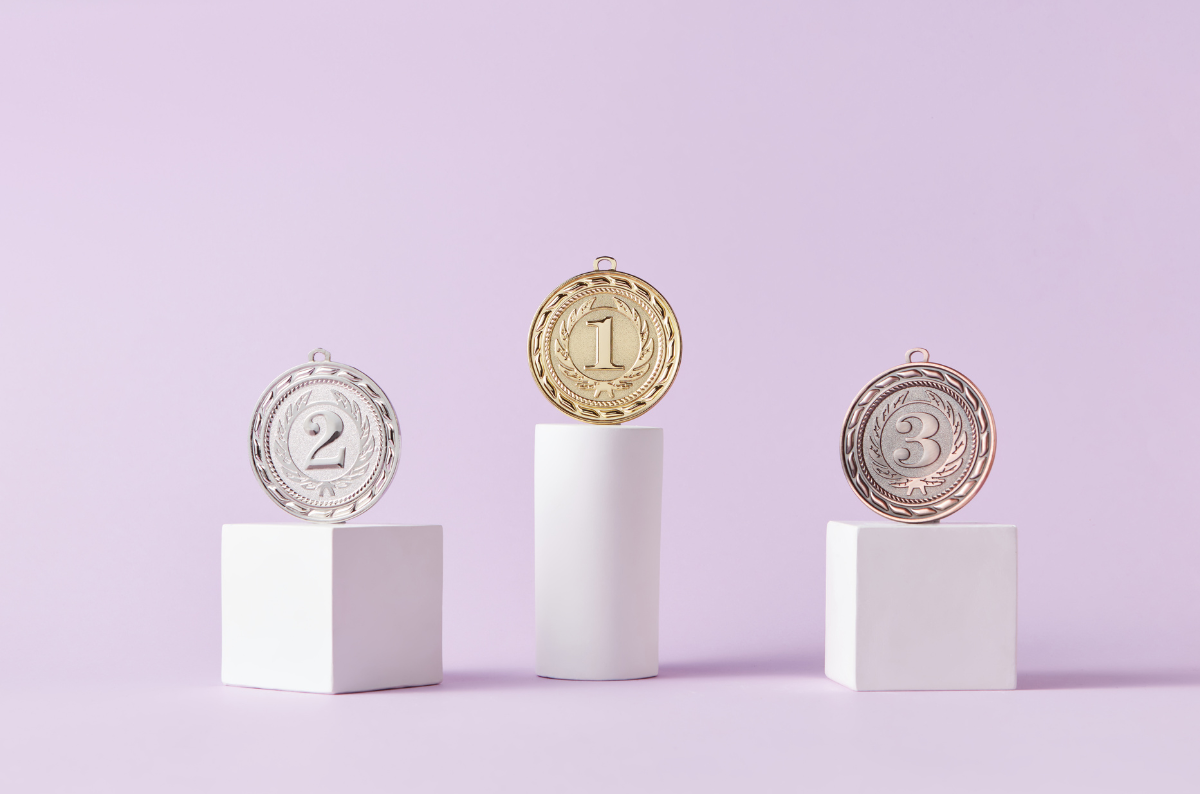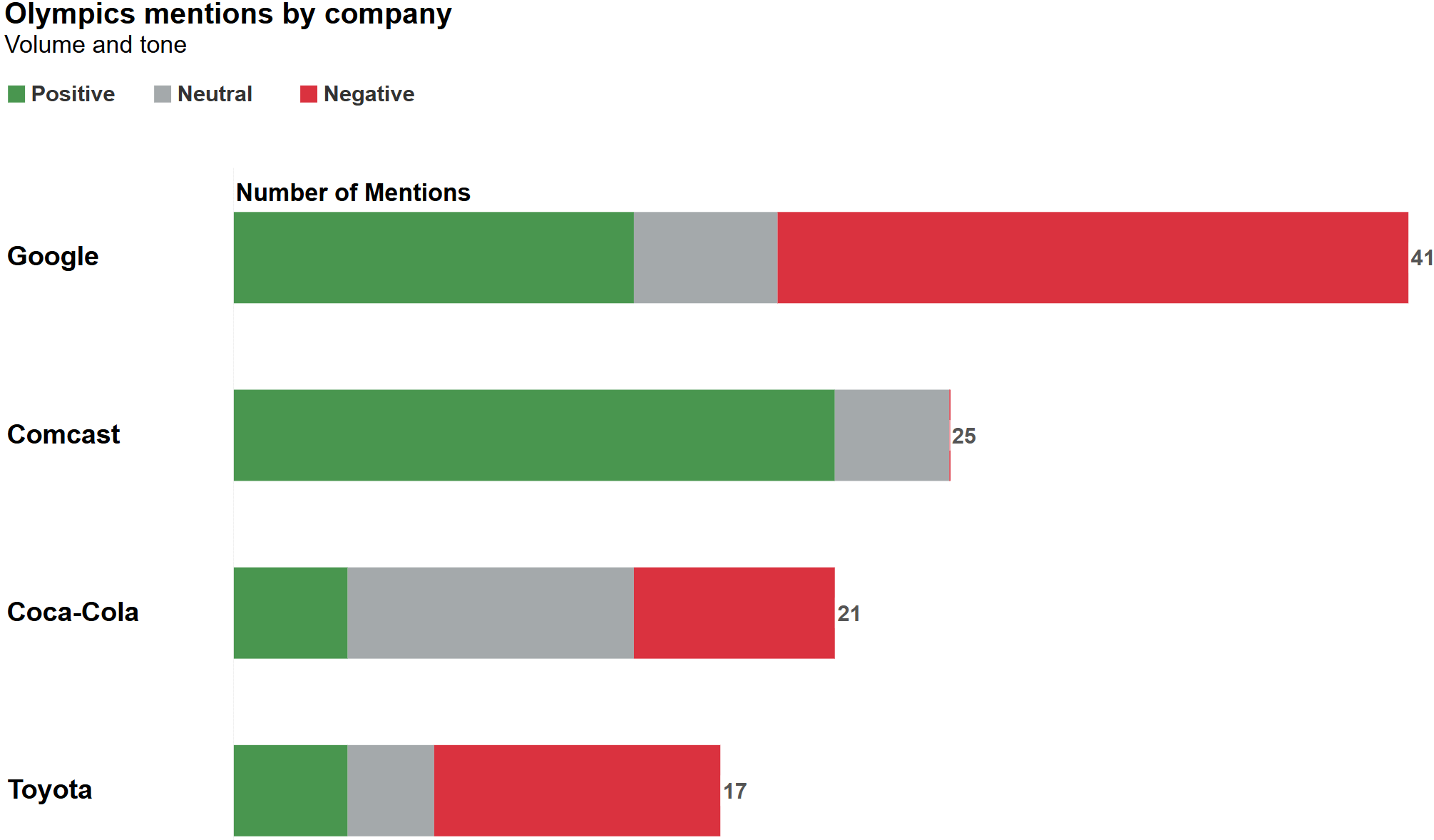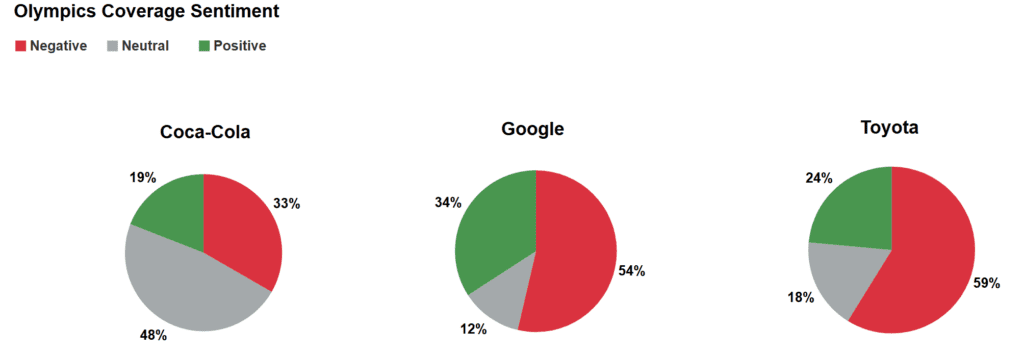
The Olympic Appeal: A Media Opportunity Like No Other
With the 2024 Paris Paralympics set to start soon and focus quickly shifting to the 2026 Winter Games in Milan and the 2028 Games in Los Angeles, many PR and Communications executives are preparing to capitalize on the opportunities the events provide for brands with Olympic media coverage.
The Olympics offer a golden stage for brands to showcase their message to a global audience. As one of the most-watched events globally, the Olympics had 30.6 million viewers in 2024. The sheer number of eyeballs glued to screens worldwide offers an unparalleled platform for brands to showcase their messages.
One company that seems to have benefited greatly in media coverage of their Olympic support was Comcast. Every mention we analyzed was either neutral or positive in tone. In fact, there were glowing accounts of Comcast’s Peacock app coverage, their use of shortform content on social media, and more.
For smaller brands as well, the Olympics can be a game-changing opportunity. A well-executed campaign can introduce a brand to millions, creating lasting impressions that can drive business growth.
However, this high visibility can also attract unwanted attention.
Our analysis of corporate media coverage around the Paris games surfaced some insights that could help communicators make the most of these upcoming opportunities and avoid the potential risks involved.

The Dark Side of Olympic Media Coverage
While the Olympics offer immense opportunities, they also come with significant risks. A lot of eyes can be great for a winning campaign – or it can go down in history as an utter failure. Further, controversies that extend beyond sports often surround the games.
The Consequences of a Misfired Campaign
Given the visibility of the Olympics, there are elevated stakes for high media uptake on a brand campaign. A campaign that missteps in tone can have an effect opposite the desired brand impact. This year, one of the more visible misfires was Google’s Gemini advertisement, which Google pulled from the Olympics airwaves after backlash in the media. While it seemed intent to represent a cute interaction between a child and her role model, it was accused of endorsing “automation instead of authenticity” over the use of AI to write a fan letter, something which many could argue goes against the Olympic spirit.
Another example of Olympic sponsorship backlash involves Toyota’s use of hydrogen-powered cars as official transport vehicles during the games. While the initiative intended to showcase Toyota’s commitment to sustainable technology, environmentalists criticized it, arguing that the vehicles were not as green as they appeared. Critics pointed out that hydrogen production often relies on non-renewable energy sources, making the cars less environmentally friendly than their all-electric counterparts. This criticism was covered in major outlets, and serves to highlight the complexities of promoting innovative green technology on a global stage. It also underscores the risk of backlash when a sponsor’s environmental claims do not fully align with public expectations.
We also see this misalignment with Olympics sponsor Coca-Cola. The company was hit with negative coverage on multiple fronts around their support of the Games. At an event deemed “one of the most eco-friendly Games in history”, Coca-Cola, came under fire from environmental groups and athletes alike for its use of plastic, warranting an official response from the company. Then, in another instance, health experts called Coca-Cola’s role as a sponsor in general into question. They claimed the organization was “sportswashing” its generally unhealthy products by aligning with the athletic endeavors of the Olympics.

The Decline of the Olympic Brand
Toyota again made headlines for its decision to end its sponsorship of the Olympics after Paris 2024. The company’s withdrawal from Olympic sponsorship highlights two significant reputational risks associated with sponsoring the games: geopolitics and athlete welfare.
Firstly, the geopolitical landscape surrounding the Olympics has become increasingly fraught. The games are often mired in scandals, corruption, and controversies over host nations’ human rights records. Toyota, like many global brands, found its reputation at risk by being linked to these issues. This was especially true during the Tokyo 2020 games, which faced heavy criticism for proceeding amid the Covid pandemic and local corruption scandals. Increasing geopolitical instability means Olympics sponsors are likely to face more reputational challenges related to these issues in the future.
Secondly, Toyota was concerned about how its sponsorship money was allocated, with reports indicating that funds were not effectively used to support athletes or promote sports. This misalignment with the company’s values led Toyota to conclude that the risks of continuing its sponsorship outweighed the potential benefits.
In Summary: The Complex Landscape of Olympic Branding
The Olympics present a unique media opportunity for corporate branding, but the landscape is fraught with challenges. The Olympics has two main types of PR risks:
- External risks in terms of the controversies the Olympics brand itself attracts, and –
- It is also likely to magnify preexisting reputational issues due to the heightened visibility.
While at face value the Olympics bring about an image of excellence, friendship, and respect – values any company would be proud to associate with – global realities and stakeholder expectations adds more to the picture that communications leaders should be aware of.
To learn more about our research and analysis, contact us here.